Counter Culture
How cooks at community kitchens are rustling up a lot more than meals on their countertops.
A sign reading “God may bless this kitchen, but He doesn’t clean it” hangs in a window of the stainless-steel-filled kitchen at Westminster United Church. On a Friday evening in July, the sign overlooks a tidy scene ready for a pie-making workshop. A line of pristine silver mixing bowls, each with recipe cards nestled inside, rests on damp tea towels that will keep the bowls from skidding when whisking begins. But the calm and cleanliness will be short lived as the room, which sits a floor below the nave and next to a dining hall, fills and the lively group turns to baking.
A blueberry pie is already in the large industrial oven, filling the air with a hint of what’s to come, and a large pot of blueberries burbles on a stovetop. When everyone has arrived, there are eight of us, led by Margo Tasker, who is running this workshop for the Saving Thyme with Margo YouTube series she produces for the Orangeville church. In addition to sampling the blueberry pie, each participant will also make a strawberry-rhubarb version to take home.
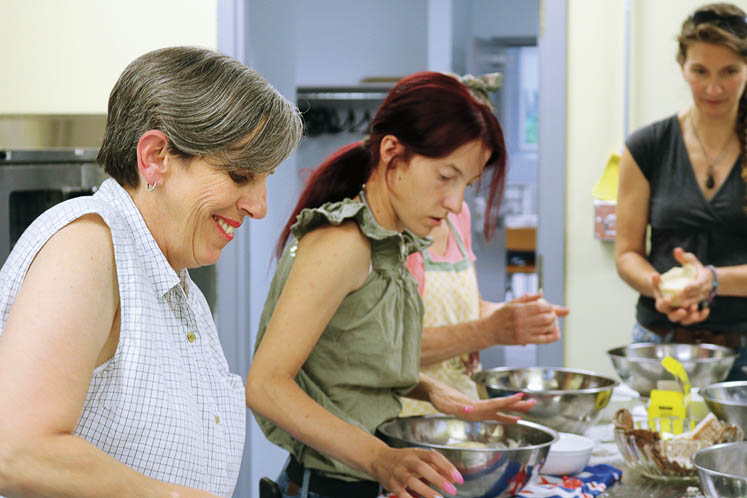
Workshop leader Margo Tasker (left) with attendee Franziska Sechin. Photo by Isabel Buckmaster.
Friendly and focused, Tasker moves about the room, attending to questions as the women roll out dough, place it in pie tins and pile in sugared fruit and cubes of butter. When one woman needs an extra hand laying in her crust, Tasker pinches an example into place. When another woman asks how she could adapt the recipe for her motorhome’s kitchen, Tasker discusses heat settings. Starting to feel at home, others are quick to lean in and offer solutions, even if they’re just for how to battle the cling film.
Her flour-dusted hands hovering in anticipation, 13-year-old Taia Savazzi dances about, then unfurls her top crust over the filling before Tasker utters her instructions. Taia’s brow never unfurrows, and she eventually peels back the crust to accept Tasker’s advice – and proffered cubes of more butter – before crimping everything back in place.
Taia is on hand to boost her pie-making bona fides with an eye to expanding Mulberry Girls, the home-based jam and jelly business she operates with the help of her younger sister, Eden. Others attend because they’re fans of the YouTube channel or they heard about the program while attending a church event. And Tasker, who has overseen the kitchen as the facility and program manager since January 2021, is the kind of charismatic community leader who excels at both delivering a good time and building on the promise of this kind of kitchen operation. For her, it’s all about sustainability and cooking on a budget with in-season produce – with personal connection an important side dish. “I really feel like these workshops are a boost to a feeling of belonging in the community,” she says.
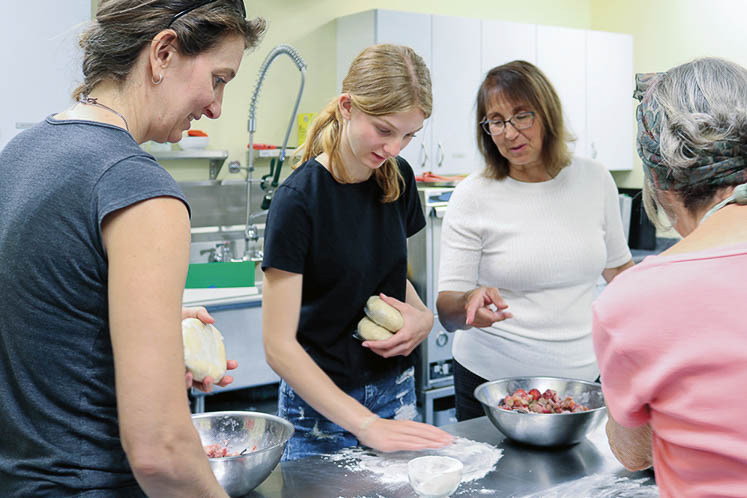
Pie makers Heather (left) and Taia Savazzi, with Julie Munshaw. Photo by Isabel Buckmaster.
Saving Thyme started in February 2021 after the pandemic nixed group activities in the church’s newly renovated commercial kitchen. But adapting and overcoming life’s obstacles is built into the DNA of community kitchens. As we emerge from the worst of the pandemic, here and elsewhere across Headwaters, these spaces are filling up again.
Usually found in churches such as Westminster, as well as at food banks and other social service nonprofits, community kitchens offer programs as diverse as the groups that run them. These kitchens may enable staff to transform shopping deals and fresh-food donations into take-home dishes for those in need – and the dishes are sometimes made by the agencies’ clients themselves. Or the kitchens may welcome people hoping to learn about home-style, budget-friendly cooking in a social setting. Some organizations rent the spaces for as little as $20 an hour to local food entrepreneurs looking for a public-health-certified workspace on a shoestring.
Anywhere they exist, community kitchens are a hive of activity, adorned with beloved cooking utensils and professional-level equipment, and buzzing with mission-driven chefs.
The promise of fresh food
At the Orangeville Food Bank, where feeding people is job number 1, their kitchen has doubled in size to meet the increased use. A “last resort” for going on 30 years, this food bank has seen a 210 per cent increase in the number of employed people and a more than tenfold increase in the number of seniors coming through its doors over the past five years, says Heather Hayes, the executive director. A typical month for the bank means seeing nearly 700 people, more than two-thirds of them children.
Though pandemic restrictions halted public programs for some time, the kitchen is at the heart of the operation. It’s where fresh produce, fruit and meat is made into prepared dishes to complement with a personal touch the boxed and canned goods on offer. “If somebody shares their food with you, they’re sharing their hearts and I think that certainly speaks to me personally here at the food bank,” says Hayes.
Some of those dishes may be built on produce many people don’t cook for themselves, even if it is cost effective. Singles, families new to cooking and seniors, for example, may hesitate to reach for produce such as giant summer zucchini. “With a zucchini, you can slice it down, freeze it, make zucchini bread out of it,” says Hayes. “But if you don’t have a freezer, you don’t have a grater and using an oven is not an option, then what do you do with a 10-pound zucchini?”
Many donations come via grocery stores, with a clock ticking on ripeness, so in-house chef Mark Comendador works fast to use it all up. “We can turn things into a sauce, we can turn it into a soup, we can use it as a basis for a meal and then give to clients,” says Hayes. “There are lots of opportunities for us to take that excess and make use of it.”
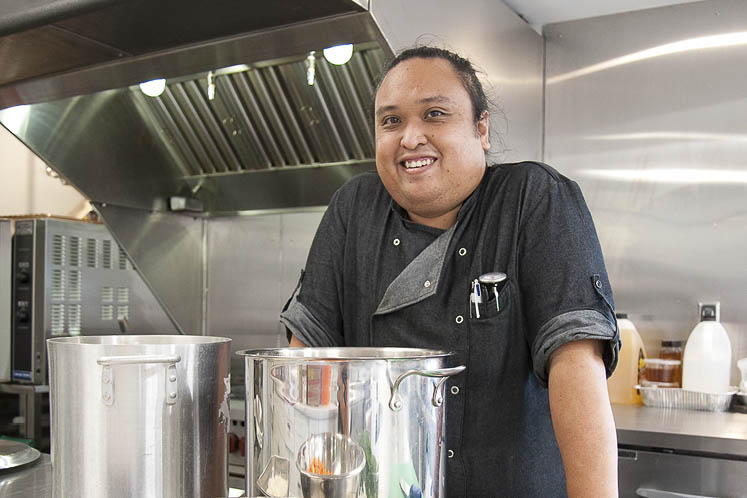
Orangeville Food Bank chef Mark Comendador. Photo by Rosemary Hasner.
Hayes recalls entering the kitchen to find the counters covered in malanga, the result of a donation of the Caribbean root vegetable. The kitchen staff were stumped by what to do with the textured vegetable, commonly used in South America and Africa, and easily confused with taro root. Then Barb White, a food bank volunteer who also runs the in-house café at Centre Fellowship Church, came to the rescue, making a “beautiful” soup, which Hayes recalls had a nutty, earthy taste.
More options are now about to be realized, the result of a donation that funded a dehydrator, enabling Comendador to dehydrate and freeze produce such as fresh kale.
Hayes tries to make the food bank and its kitchen feel like home, but understands that, depending on a client’s background, visiting the community space can feel anything but. “I had somebody confide in me that they never thought they’d have to use or eat food from a food bank again,” says Hayes. “Yeah, there are some memories that are stirred up, but it reminds us that food banks are not the solution to food insecurity.”
Fostering a sense of community
In the meantime, Hayes and others are working to replace those memories with both food and warm ties to the community. At the community kitchen in Palgrave United Church – founded in 2009, making it one of the first in the area – the herb and vegetable garden on the grounds plays an important role. “I have been in the church and looked out the window, and seen someone stop, come over, help themselves to some of the herbs and leave. I don’t consider that stealing,” says kitchen co-ordinator Barb Imrie, who encourages people to help themselves. “So we don’t have a little pantry as much as we have a little garden.”
On a day this past July, kids from Dirt 2 Delicious, the kitchen’s annual summer daycamp program, were bustling around the well-equipped kitchen, where campers were learning how to eat and cook sustainably. As the finale of the summer program, the group prepared a lunch for community members, including local seniors and church staff. The kids created their own menu, whipping up quiche, salad and strawberry shortcake, with a side of iced tea spiced with fresh lemon balm from the garden.
When the Covid lockdowns were put in place, says Imrie, every one of the kitchen’s programs – from the hot lunch program to another called Soup’s On – was cancelled or moved outside. Even the garden was affected, though the change probably delighted butterflies. Plants chosen to attract the pollinators replaced some of the herbs and vegetables usually grown there.
For Imrie, who has worked at the kitchen since it opened, the hubbub that once again filled the space marked a welcome return to normalcy. Over the past two years, when they couldn’t set foot in the kitchen, the Dirt 2 Delicious campers visited local farms to learn about food origins and followed recipes at home. But, says Imrie, “Virtual cooking doesn’t work well. We missed the connections. We missed the hands-on. We missed the eating together.”
Foodie entrepreneurs
In addition to camps and other community programs, Imrie is proud of the role the kitchen has played as a small business incubator. Keri Parfitt, who runs the well-known Orangeville-based Wicked Shortbread, always recommends the Palgrave kitchen to anyone hoping to rent affordable time in a certified commercial kitchen with flexible hours. More than a decade ago, Parfitt was one of the first local entrepreneurs to use that kitchen.
“I don’t know if I could have done it without Palgrave,” says Parfitt, who says it took a while to get used to the kitchen’s ovens. “We used it a lot as we began before we had the store, had our own kitchens.” She spent about a year there, baking and packaging her melt-in-the-mouth Scottish shortbread cookies to sell at farmers’ markets and wholesale before opening her own bakery in 2012. Ten years later, Wicked Shortbread maintains two storefronts in downtown Orangeville, having opened the second location in November 2021.
At Westminster, Tasker reports an uptick in new entrepreneurs looking for a certified commercial space. One of them is Shelburne-based, cold-pressed juice maker Nikki Holness. During the pandemic, both she and her husband, Tyrone, were working full-time until Holness took maternity leave from her banking job. The two rarely found a moment alone while caring for their five children, a number that now includes the new baby. One day Tyrone, who works in transportation logistics, asked, “If you could be doing anything other than working at the bank, what would it be?” And Holness told him she really wanted to open the juice bar she had always talked about.
Tyrone’s question started Holness thinking, and she approached her sister-in-law, Kemesha Sterling, with the idea. Sterling was enthusiastic, but the two decided that rushing to open a storefront would be too expensive and risky. So after taking some online training specific to the juice business, they took the first steps.
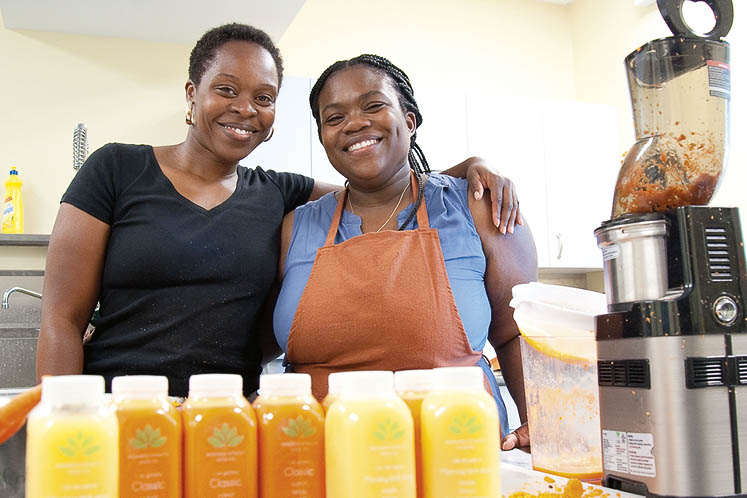
Nikki Holness (right) and her sister-in-law, Kemesha Sterling, are the Shelburne-based partners in Renewed Vitality Juice Co. Photo by Rosemary Hasner.
Although Holness owns a juicer – her cold-press juicing relies on a hydraulic press to squeeze juice out of fruit and vegetables ranging from mangos to beets – she and Sterling lacked the physical space needed to produce juices commercially. So Holness connected with Tasker to rent Westminster’s space weekly. And last May she and Sterling debuted their online store, Renewed Vitality Juice Co., the first of its kind in Shelburne. They accept orders online and deliver to Shelburne, Dundalk, Orangeville and Alliston – and hope to open a storefront in 2023.
At Westminster, the busy young mom doesn’t have to worry about distractions even if she’s in the kitchen for 10 hours straight. “With all my produce, I need a large kitchen space that is sanitized and separate from the heavy flow of traffic of my kids and husband,” she says. “The commercial kitchen space has flow, it has proper sanitizing solutions, and it has a separate sink specifically for washing your hands, which is very important when producing anything that’s consumed by the public.”
Social enterprise too
Other organizations, such as Orangeville’s Branching Out Support Services (BOSS), which provides day programs and other services to people with neurodiversities, such as autism and Down Syndrome, are taking their first steps down the community kitchen path.
BOSS founder Kimberly Van Ryn says the group’s new social-enterprise-focused Commonfare Kitchen builds on their mandate to offer meaningful programming for their clients and their families. “I love seeing neurodiverse people, who have maybe not had as many opportunities as neurotypical people, be able to find a purpose, learn skills and move out and about in their community with confidence because they’ve learned those skills in a safe space,” says Van Ryn.
The kitchen should be certified and up and running – and available for rent – by mid-September. “It’s really important for people to know that when they rent with us, when they buy products from us, they’re actually really contributing to a much larger cause,” she says.
Feel-good collective cooking
Back at Westminster’s pie-making workshop – only the second held in-person this year – Tasker and videographer Shannon Dobson are documenting the fun for the YouTube series. (The two met during the pandemic when Tasker was babysitting a friend’s children and Dobson arrived to walk the friend’s dog.)
Amid all the fun and flour dust, Tasker aims to show that everyone can cook affordably and sustainably at home. Preparing food on a budget, during a set time, and in a reasonable way are various aspects of food literacy emphasized during Saving Thyme with Margo. “I always say, ‘These are the sales. Grab it now,’ and ‘Put it away and hold on to it.’ I’m a waste-not, want-not kind of cook,” she says.
An advocate of backyard gardening, Tasker encourages viewers to make use of anything they have at home by freezing and preserving. (This also applies to everyone who uses the Westminster space. Leftovers in the fridge can range from rose water to kangaroo jerky.)
As group members work on their pies, talk turns to the name of Taia Savazzi’s business venture and what, exactly, a mulberry tastes like. “A bit tart, kinda like a blackberry,” Taia’s mother, Heather, tells Julie Munshaw, another attendee. “I feel like they taste like a mix between a blackberry and a raspberry,” Heather adds.
Among other fruit, the Savazzis are now cultivating an orchard of seven mulberry trees, some grown from cuttings taken from a tree at the family’s previous home in Toronto. Explaining how the bountiful harvest from that tree inspired Mulberry Girls, Taia says, “We couldn’t eat all of the berries and they were just going into our freezer, so we started making jam.”
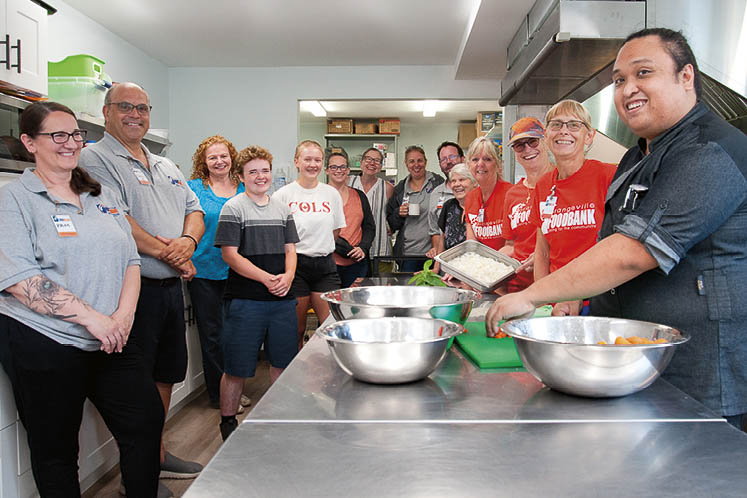
In the Orangeville Food Bank kitchen are a mix of volunteers and staff. Photo by Rosemary Hasner.
Tasker checks in again with the group, hovering to lob a compliment when the excited chatter melts into doubt. Every so often, she steps back to take in the whole picture, grinning ear to ear as the women work, standing shoulder to shoulder. A steady beeping causes Tasker to stop midtask, tea towels seeming to levitate into her hands, as she turns toward the oven to inspect the first results. “Oh, Shannon you’re going to want to see this,” she says, as the rich blueberry scent fills the room.
As the group jockeys for a closer look, deep purple juices bubble up the side of the pie, its crust crown perfectly golden and glistening. Serving a slice to each member of the workshop, Tasker takes a seat at the head of the table. The room quiets as this group of neighbours, some of whom have never met before and may never come together again in this way, dig in. For this kitchen and Tasker, its tireless cheerleader, it’s mission accomplished.
Related Stories

A Community Steps Up: Orangeville Food Bank
Nov 24, 2020 | | Local HeroesWhen the pandemic caused a spike in need, executive director Heather Hayes and a small army of staff and volunteers worked overtime.

Ann Randeraad
Nov 22, 2019 | | ArtsThe self-taught Amaranth potter is the force behind a decade of the annual Empty Bowls food bank fundraiser at Alton Mill Arts Centre.
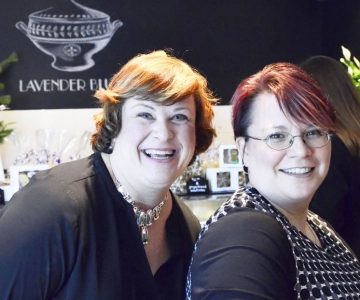
“There was no time to wallow”
Jun 25, 2020 | | Pandemic JournalsHow the duo behind Orangeville’s Lavender Blue Catering are keeping Dufferin fed.
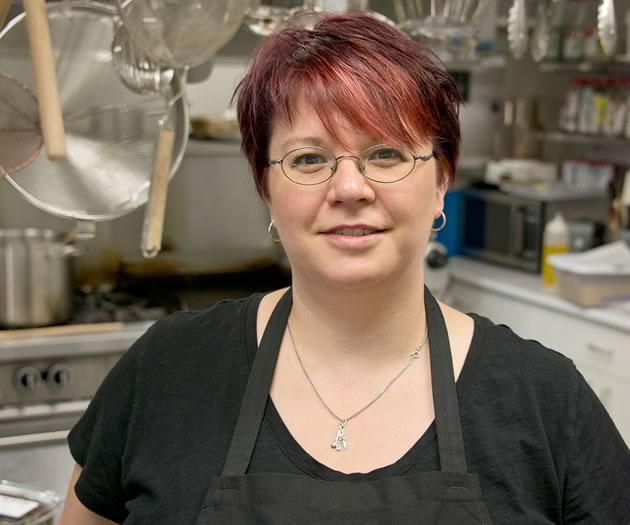
Cooking with Lavender Blue Catering
Nov 22, 2016 | | Cooking with...Warm up to winter with chef Terry Doel’s Moroccan lentil stew.











